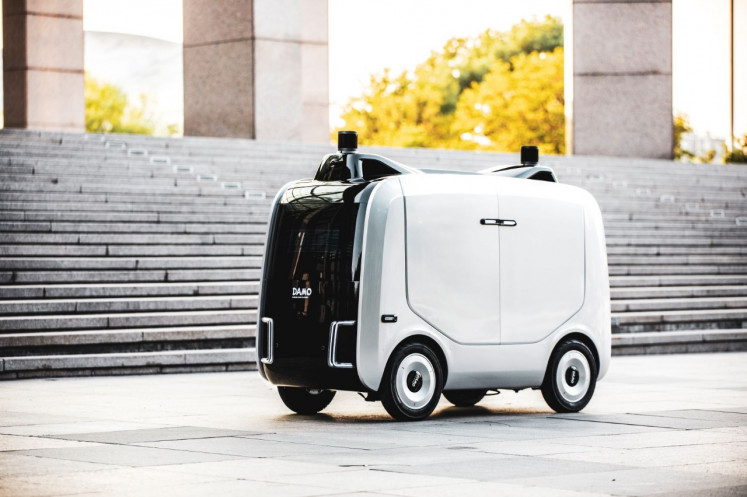
[ad_1]
Garuda Indonesia, the country’s flag carrier, has adopted cloud technology from the Chinese company Alibaba Cloud for cost efficiency as Alibaba launches a lightweight personal cloud computer and an autonomous delivery robot.
Garuda IT digital transformation senior manager Pungky Prasetyawan said that by adopting cloud technology, the company had seen more than a 60 percent improvement in cost efficiency.
“In the face of challenges [brought about] by the spread of the COVID-19 pandemic and the resulting travel restrictions globally, Garuda Indonesia has been looking for a digital transformation solution,” he said during a media briefing on Thursday.
He added that after migrating to cloud computing, the company was able to have more teams work remotely.
As the technology reduced network latency, Garuda’s corporate website, mobile application gateway and booking and ticketing services had become faster, he added.
As of July, the airline had seen a 61 percent year-on-year (yoy) drop in total passengers, down to 3.6 million passengers, as the pandemic all but grounded the travel industry. Garuda also recorded a US$712.73 million loss in the first half of this year after booking net profits of $24.11 million in the same period last year.
Garuda began its migration to cloud technology in 2015, transferring its on-premise e-mail to the cloud and distributing aircraft manuals online, among other changes.
Alibaba Cloud is working with telecommunication company Indosat Ooredoo and cloud service provider ViBiCloud to provide a cloud data center for Garuda.
“Our proprietary cloud technologies will help Garuda Indonesia continue to deliver innovation and agility in the market, offering a seamless user experience for consumers in Indonesia,” Alibaba Cloud Indonesia country manager Leon Chen said.
Alibaba plans to create a third cloud center in Indonesia by 2021 after establishing its first two data centers in 2018 and 2019.
On Thursday, Alibaba launched a lightweight personal cloud computer and an autonomous delivery robot, among other technologies, during its annual Apsara Conference.
 Alibaba launched a last-mile delivery robot called Xiomanlv on Thursday. The robot aims to assist in the delivery of packages to campuses and business parks in China. (Courtesy of Alibaba/-)
Alibaba launched a last-mile delivery robot called Xiomanlv on Thursday. The robot aims to assist in the delivery of packages to campuses and business parks in China. (Courtesy of Alibaba/-)
Alibaba cloud intelligence president Jeff Zhang said that the recent changes brought about by the pandemic, namely the rise of remote work and e-commerce, had led the company to create relevant solutions.
“As working from home becomes the new norm during and after the pandemic, we hope our cloud computer can help people access resilient computing power whenever they need to with a tiny personal computer,” he said in a speech during the conference.
He added that the computer could be used to conduct complex tasks that usually required sophisticated PCs, such as video editing, software development and online customer service.
The computer is a palm-sized device that can be connected to a normal computer screen. Users can access computing resources by subscription or by actual data consumption.
 Alibaba launched a lightweight cloud computer on Thursday. The device can be connected to a normal computer screen to enable remote work. (Courtesy of Alibaba/-)
Alibaba launched a lightweight cloud computer on Thursday. The device can be connected to a normal computer screen to enable remote work. (Courtesy of Alibaba/-)
While the computers are currently available only to enterprise customers, the company said the devices would soon be available for purchase by individuals.
Zhang also introduced an autonomous last-mile delivery robot called Xiomanlv to cater to the growing need for fast delivery services in China. The country is expected to see more than 1 billion packages delivered each day in the coming years.
The delivery robot is estimated to be able to deliver up to 500 packages a day to one designated community or campus and can travel 100 kilometers on a single charge.
“We are expecting a rapid jump in delivery demand brought about by thriving new retail in the increasingly digitalized world,” Zhang said, adding that the robot would complement Alibaba’s logistics platform Cainiao to serve communities, campuses and business parks in China.
The Apsara conference will also be a launching ground for various cloud products, such as the Cloud Lakehouse big data architecture and Lindorm, a multi-model database to support the Alibaba Group ecosystem. (eyc)
[ad_2]
Source link